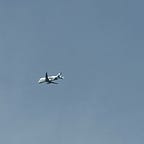Vaccinated. Yes! Safe? Not Sure…
Vaccine availability, efficacy and hesitancy remains a huge concern everywhere even as the number of reported COVID cases are on the up
In such a scenario being cautious, following mask requirements, maintaining general hygiene and adhering to social distancing norms continue to remain applicable even to those who have been vaccinated
It is not over until the fat lady sings…so goes the proverb. In this case it was not over until the old lady stabbed.
Stabbed, as in the syringe.
Even as we checked in, as scheduled, to be administered the second shot of the coronavirus vaccine there were no nervous moments. Suffice to say experience with the first shot had ensured I was better prepared for the second. The doctor was aware of my fear of needles/syringes. She had seen me break into a cold sweat quite a few times before. Yet her opening statement did little to assuage.
“You have been through this before. So you know,” she said. Every experience with the needle/syringe is a new one, and in isolation — irrespective of the previous experience(s). At that point though, offering an explanation or getting into an argument was the last thing on the mind. The idea was to get it over and done with, and get out of that spooky place that a clinic/hospital is.
The veteran doctor had brought a medical intern along with her.
“Would it be okay with you if she (the intern) administers you the vaccine?” she asked my better half, who nodded in agreement. Even as I was wondering why the option was not given to me, the doctor turned around and said, “And I will give you the vaccine myself.” I was too preoccupied with thoughts of the first dose to react. Back then the jab had ensured four days of pain to my arm.
The intern, palpably cautious, applied a cleansing solution to my wife’s arm, used alcohol swabs to clean the area before injecting it gently. As regards yours truly, well it was a sense of deja vu. No cleaning. No alcohol swabs. The doctor just stabbed the syringe into my arm, even as I looked into the other direction. Like I said on this occasion I was aware what to expect, and as such a lot better prepared.
The jab had been administered. The job was done. The entire process was over in a few minutes. Unlike during the first dose, the doctor didn’t ask us to wait for some time to observe if there were any side effects. Our documents — the vaccine passports and the all-important QR codes were ready, and we left the clinic in quick time.
After 18 months of being cautious, following mask requirements, maintaining general hygiene consciousness and adhering to social distancing norms we are now fully vaccinated. It was sheer coincidence that we got our second dose administered on the second day of a nationwide vaccination week in Germany.
But are we safe? Well, that’s by no means a certainty. When I asked my doctor the same question her response was a terse “We don’t know”, but she did add an assuaging statement as an afterthought.
“It is still better than not getting vaccinated at all.” Truth be told the pre-vaccination norms are to be followed, for safety reasons of course. You being conscious is no guarantee that others around you are. Vaccine hesitancy remains a huge concern everywhere even as the number of reported cases are on the up across the world. It is being said that most of the cases in intensive care units are those people who are yet to get vaccinated. Besides, the availability of vaccines or for that matter their efficacy against the highly contagious delta variant continues to remains a topic of discussion.
Health experts around the world are of the view that in the near future people who are not fully vaccinated are more likely to be hospitalized than those who have received both the jabs. It is also not certain if a booster shot will be enough, or if there will be the need to inject multiple booster shots at regular intervals.
Despite of all these concerns Europe is slowly but steadily opening up. On September 10, Denmark became the first European country to fully ease restrictions. Things are also back in order in both Sweden and the Netherlands. France has an efficient albeit a tad controversial COVID pass, with a QR code. Most states in Germany are following a 3G model — a uniform COVID health pass system which allows entry to many public spaces only to people who have been vaccinated (geimpft), have recovered from COVID (gensesen) or have been tested (getestet). Some states like Hamburg have also introduced a 2G option model, effectively banning unvaccinated people.
In simple terms the 2G rule means that business owners, like those who operate cinemas, fitness studios, hotels, swimming pools, theatres and trade fairs will be allowed to offer their services only to people who are fully vaccinated or have recovered from COVID within the last six months.
Then there are more assurances. The governments are also promising no further restrictions for vaccinated and recovered people.
Perhaps this is the positive side to being vaccinated. One can move around with a little more freedom. One can frequent cafes, cinemas, malls, restaurants, stadiums, theaters and even plan an elaborate holiday. Suffice to say even an iota of positivity is a motivating factor in these negative times.
